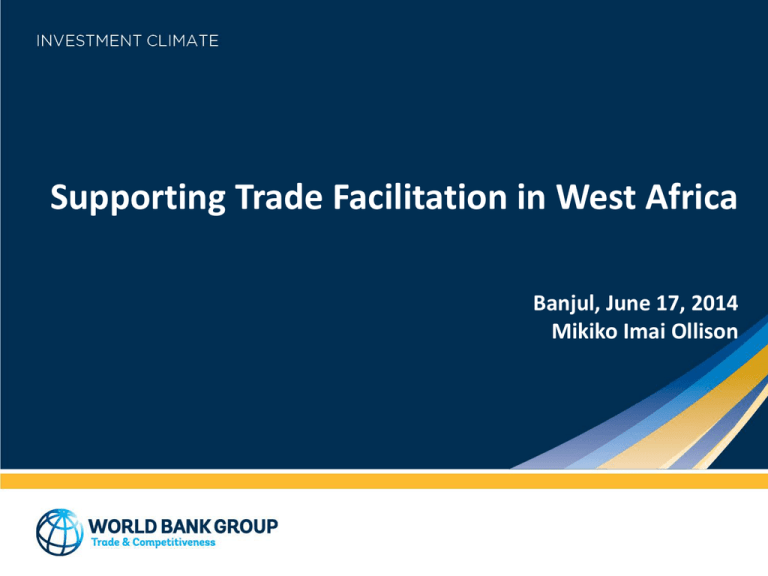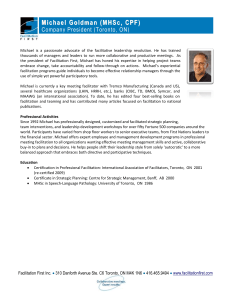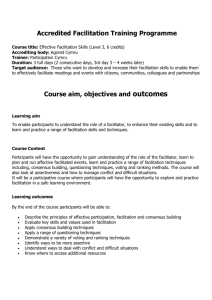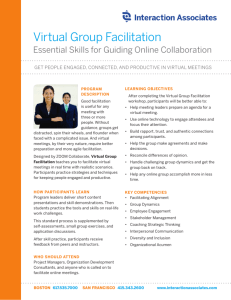Supporting Trade Facilitation in West Africa Banjul, June 17, 2014
advertisement

Supporting Trade Facilitation in West Africa Banjul, June 17, 2014 Mikiko Imai Ollison Contents Why is trade logistics important? WBG Trade Facilitation Support WBG implementation of Trade Facilitation Support Program 2 Trade Facilitation – A couple of definitions “simplification, standardization, and harmonization of procedures & processes and associated information flows to move goods through the supply chain in a transparent and predictable manner” “identifying and addressing bottlenecks that are imposed by weaknesses in trade related logistics and regulatory regimes and that prevent the timely, cost effective movement of goods.” “trade facilitation measures are basically an extension of market access procedures that lower transaction costs and increase timeliness of transit.” 3 Why does it matter to countries? --West Africa’s private sector face long time delays to export and import Time to Export a 20-foot container through the closest port (days) Time to Import a 20-foot container through the closest port (days) Niger Niger Burkina Faso Burkina Faso Guinea Ghana Mauritania Mauritania SSA average SSA AVERAGE WEST AFRICA AVERAGE Côte d'Ivoire Mali Nigeria Benin Mali Sierra Leone WEST AFRICA AVERAGE Guinea-Bissau Guinea Côte d'Ivoire Sierra Leone Togo Togo Gambia, The Liberia MIDDLE INCOME average Benin Nigeria Middle income Average Ghana Guinea-Bissau Cape Verde Gambia, The Liberia Cape Verde Senegal Senegal OECD average OECD AVERAGE 0 20 40 60 Import 32 days OECD Average West Africa average Export 10 days Import 11 days Export 27 days Source: DB 2014 0 20 Source: DB 2014 40 60 80 There is a disproportionate burden on small firms Average logistics cost as a % of sales 45 42 40 35 12.7 30 25 20 15 29.4 18 18 6.28 7.31 11.36 10.63 18 11 10 5 6.9 0 Les s than US$ 5 M US$ 5 M to US$ 50 M US$ 50 M to US$ 500 M Inventory Management &Warehousing More than US$ 500 M Transport &Dis tribution Source: Centro Logístico de Latinoamerica, Bogota, Colombia. Benchmarking 2007: Estado de la Logística en America Latina Anexo, María Rey LogisticSummit 2008 …and in the West African countries these high costs are driven by documentary and clearance procedures West Africa region average import time (days) 19 84.5 days 5 days 3 Source: DB 2014 5 5 DAYS 4 days 3 4 14 days 12 DOCUMENTS ASSEMBLY AND PROCEDURES CUSTOMS AND TECHNICAL CONTROL TERMINAL AND PORT HANDLING INLAND TRANSPORT Document Preparation & Clearance Port Handling & Inland Transport Categories accounting for more than 50 % of the total time to export and import in many countries around the world. Categories accounting for 30 40% or less of the total time to export and import . (Global). Contents Why is trade logistics important? WBG Trade Facilitation Support WBG implementation of Trade Facilitation Support Program 7 World Bank Group Trade Facilitation Support World Bank Group is a major provider of trade related assistance throughout the world Fiscal year 2013 - $5.8 billion devoted to trade facilitation projects Two thirds devoted to low or lower middle income countries Over 120 customs and border management projects over past 20 years Focus on three themes critical to improving trade competitiveness: 1. Institutions Customs and border management agency modernization Adoption of simplified and harmonized procedures in line with international standards (WTO/WCO) ICT 2. Infrastructure Ports Border facilities Road and rail networks 3. Logistics Services Trucking Forwarding and clearing 8 World Bank Group’s support to trade facilitation is wide ranging MULTIDIMENSIONAL AND CROSS-CUTTING Technical Assistance and Capacity Building • Financing, Loans and Credits • • Focusing on export competitiveness and trade facilitation IFC investments and trade finance facilities (Around half of total Bank Group aid for trade supports the private sector directly (IFC) Policy Analysis and Advice • • DTIS Country-specific studies Global Programs and Partnerships • • Participation in the Aid for Trade initiative Enhanced Integrated Framework Data, Indicators and Research • • • Logistics Performance Index Doing Business Trading Across Borders Open Data initiative (http://data.worldbank.org) • Working papers, policy briefs, books, flagship reports • Investment climate advisory services (trade rules and regulations; SEZs) WBI South-South knowledge transfer programs World Bank Group trade facilitation projects typically align closely with TFA measures: Trade Information Portals and National Single Window systems Legal and regulatory framework review and modernization Procedural simplification and harmonization National Trade Facilitation Committees – to improve inter-agency coordination and public/private dialogue Often part of broader trade and transport projects 10 Trade Logistics Project Countries SE Europe Region - Serbia, Albania, Bosnia Herzegovina, Kosovo, Macedonia, Montenegro Liberia, Mali, Burkina Faso, Guinea Bissau, Benin, Sao Tome West Africa Region (ECOWAS) Armenia Kazakhstan, Mongolia Caribbean Region St Lucia, Antigua & Barbuda, St Kitts & Nevis, Grenada, Dominica South Asia Region India, Bangladesh, Nepal Philippines Timor-Leste & Pacific Central America Region El Salvador, Honduras, Guatemala, Nicaragua, Costa Rica Columbia, Chad, Central African Republic, Cameroon, Gabon Egypt, Ethiopia, Rwanda, Kenya, Zambia Trade Logistics projects in over 50 countries West Africa Trade Logistics project (2014-2018) Examples of planned activities: Collection of baseline data with focus on inland borders Establish Private Public Dialogue framework between trade community and border agencies Development of scorecard on compliance of international/regional agreements on trade Streamline processes and documents Enhance risk management system Automation of customs procedures Implementation of mobile technology for trade-related payments and information dissemination 12 Contents Why is trade logistics important? WBG Trade Facilitation Support WBG implementation of Trade Facilitation Support Program 13 TFSP Preparation & Implementation Support Program Objective Assist developing countries reform their trade facilitation laws, procedures, processes & systems to in a manner consistent with the WTO TFA. Program Features ─ ─ ─ ─ ─ ─ ─ ─ Implementation focused - TFA+ + WBG executed Rapid response capability Deep engagement with the private sector Strong monitoring, evaluation & results framework Complementary & sequenced TA activity WBG presence in most countries Global expertise 14 TFSP Components (1 of 2) Provision of TA - Examples Assistance to schedule commitments and implementation timelines Support and strengthen national trade facilitation committees Review/revision and drafting of trade-related laws and implementation regulations to ensure alignment with the TFA Simplification, streamlining and harmonization of trade procedures and documents to reduce time and cost to trade including the implementation of a risk based approach Review of inter-agency coordination and design of institutional capacity building plans 15 TFSP Components (2 of 2) Knowledge, Learning and Management Development of knowledge, learning and measurement toolkits and initiatives, with the WBG Trade and International Integration Team of the Development Economics Research Group Benchmarking of progress in TFA implementation, impact assessments, evaluations, and result measurement Peer-to-peer learning and experience-sharing events within and across regions 16 Program Sequencing of TFSP WBG will support countries to align to the WTO TFA – All Categories Phase 1 Phase 2 Phase 3 • Validation and review of Country Self Assessment • Produce Reform Map • Propose Sequence of Activities and Timeline • Set up NTF committee to lead the reform program • Support the categorization & commitment process • Review inter-agency coordination. • Identification and support in implementing Quick Wins and medium terms reforms • Improve transparency and predictability for traders • Review and align relevant trade laws • Harmonization, simplification of procedures & systems • Border agency coordination • Risk management • Support trade facilitation through innovative technology • Support design and software for ICT tools to implement deeper and more systemic reforms • Assistance with leveraging funds from the WB and other partners for longer term, large-scale ICT implementation, and infrastructure and institutional development projects 17 17 Importance of Reform Implementation Sequencing (Article 8) Border Agency Coordination 1.1 Publication (Publication and availability of information) 13. 2 National Committee on Trade Facilitation 10.1 Formalities and Documentation Requirements 1.2 Information Available Through Internet (Publication and availability of information) 1.3 Enquiry Points (Publication and availability of information) 2.1 Opportunity to Comment and Information before Entry into Force 2.2 Consultations 10.1 Formalities and Documentation Requirements Automation (10.4 Single Window) 18 TFSP Partners Financial Commitment of US$30 Million to date Initial Program Time Frame: June 2014 – June 2019 19 19 Contact Information To request for support, please go to our website: www.TradeFacilitationSupportProgram.org Or Contact: TFSP@worldbankgroup.org Bill Gain, Global Program Manager, Trade Logistics, wgain@worldbank.org Mikiko Ollison, Regional Trade Logistics Specialist, West and Central Africa, mollison@ifc.org 20




![Template for case studies on [Country] - Status [Month] [Year]](http://s2.studylib.net/store/data/010389880_1-c74c4455e06978d6d6860e2af1e506ff-300x300.png)